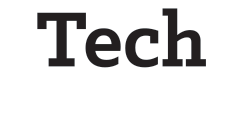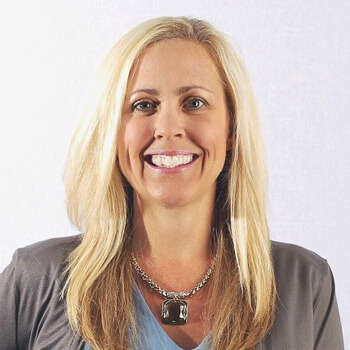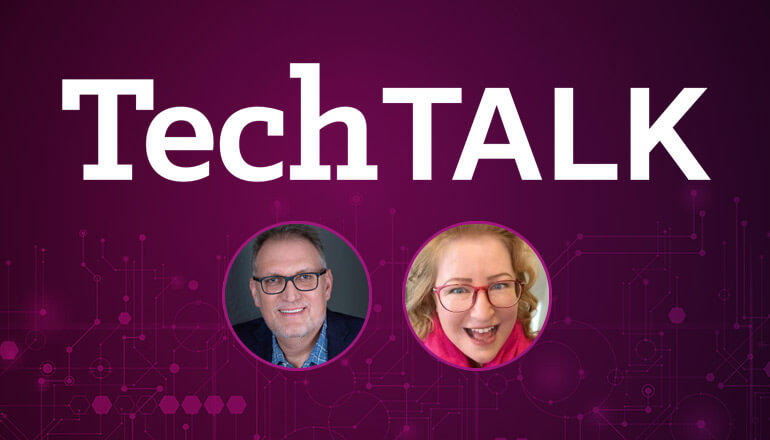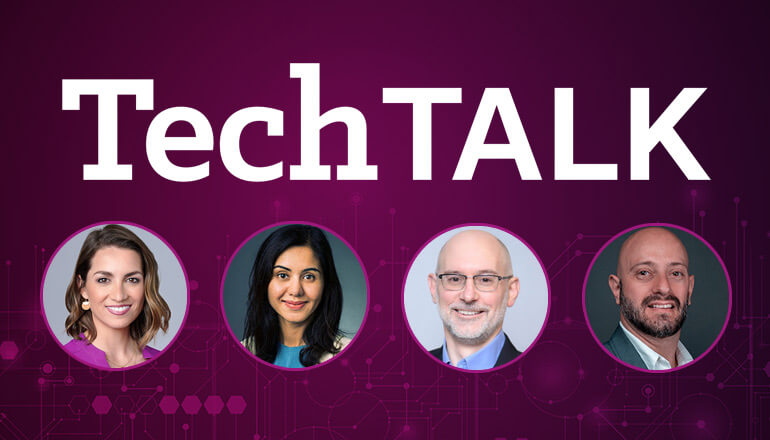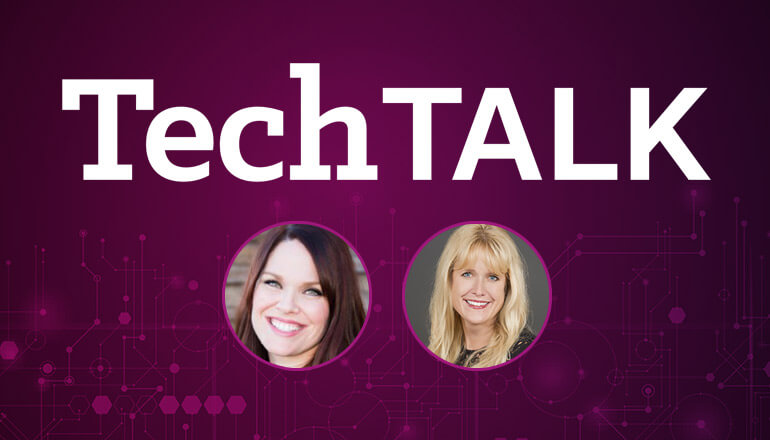Audio transcript:
Going Remote in 2020: The Employee Perspective
Published August 11, 2020
[Music]
HEATHER
Thank you for viewing our Tech Talk, where we discuss remote workers, 2020 from an employee perspective. I'm Heather Wagner, content marketing manager from Insights Cloud and Data Center Transformation team. And with me, I have Jenny Rhyu, global account executive from San Francisco Bay Area and Ryan McWilliams, one of our paid media strategists. So, thank you both for joining.
JENNY
Thanks for having us.
RYAN
You bet.
HEATHER
On March 16th, Insight’s headquarters went remote. And for me personally, it wasn't that much of a change. I'd already been working remote with the majority of my extended team also being remote for about 15 months.
So, Jenny, tell me a little bit from your perspective, what did that look like for you?
JENNY
Yeah, the transition was really interesting given that, you know, I work in the field, and most of my interaction is with clients face-to-face on site at a table, talking about initiatives and in person. So trying to transition that experience to a virtual experience, you know, getting to use video without hiding behind, you know, the no-video feed wasn't an option anymore. So, figuring out that cadence and that interaction was a challenge, but I think that was the biggest change for me personally.
HEATHER
Yeah, I bet that would be a pretty big change. Ryan, tell me a little bit about what was your remote experience like prior to that?
RYAN
Yeah, I think I'm probably on the opposite spectrum from Jenny. I was already working from home once a week, so I was kind of used to my routine when I would work from home.
But I think just getting used to seeing your coworkers virtually and not being able to tap them on the shoulder and ask them a question and, you know, having to go that extra step to have to FaceTime 'em, video call, you know, send them a chat to get an answer. That was the biggest change for me.
HEATHER
Yeah, I know when I first went remote, that was pretty much a big change. One thing that I noticed when the rest of the company went remote, my meeting times seemed to be a lot more productive. Like, there weren't so many side chitchats in the room, and you were able, from a remote worker perspective, I could really engage and be felt more, in some ways, connected with my extended team.
Jenny, with your clients, how were they positioned at that time to go remote? Was it a big lift for a lot of them, or were they pretty well already established where they could easily deploy remote workforce?
JENNY
You know, in the Bay Area, I think having a remote workforce, at least even a small percentage, was already really adopted. And, so, we had my clients, especially, who are in the tech vertical, were actually pretty well prepared to have their remote workers be remote. That was already an option for their employees. So, I think they were really prepared.
I think the piece that they weren't prepared for was just how that was going to change their culture. Being able to walk to someone's desk and ask them to get something done, that turning into this ad hoc calendar meeting that probably didn't need to be a 30-minute call, and just kind of calendar chaos. So, …but from a technical perspective, I think for the most part, they were very well prepared.
HEATHER
That's great. And Ryan, would you agree, I mean, from, like, an employee perspective insight?
You know, obviously, we're a global technology, you know, guru, so we had a lot of, you know, systems already in place. You know, we had virtual, VPNs, virtual private networks, and everything to make sure that our remote workers had what they needed and were also secure. So, did you notice any kind of challenges with that, or did you feel like it was a fairly smooth transition for you?
RYAN
For me, it was fairly smooth. I think that the two biggest things that I noticed when going remote is if we ever have an IT issue, let's say my computer shuts down, I can't just walk it over to to our IT department and say, "Help me." I have to, you know, get on the horn with somebody else and have them contact me. So, it's a whole, you know, that's a whole issue in itself.
And then also something that I've noticed personally is we're all now relying on our own private ISPs. So, if, you know, how often does the internet go down at a corporation like Insight? Usually not very often, but at home, the internet connections are a lot less stable. So, that's something that you have to work on. This last month, my internet went down three separate times, and fortunately I was able to go to my parents' house and work, but I know a lot of people aren't in that situation…where they can go to a friend or family's house given the current climate. And obviously, you know, going to work from a coffee shop isn't an option either. So that's definitely a challenge.
HEATHER
You know, and you bring up a really great point 'cause like I had mentioned, I had already been remote. And, so, there was a time period where the majority of the country started to go remote, and I noticed the exact same thing where prior to that, I rarely had any internet connection issues with my service provider. But once there was that bulk of people, now there was some bandwidth issues that they had to really quickly deal with.
RYAN
Yeah, for sure, and it always happens during the day, right? It never happens at 9:00 p.m., 10:00 p.m. when you're not really using the internet. It's always at 10:00 a.m. when you have your first or second meeting of the day.
HEATHER
Yeah, exactly.
So, as far as collaboration, Jenny, 'cause I'm sure, you know, as a field account executive, you have a lot of engagement with architects and engineers and stuff. So, tell me a little bit how your collaboration may have changed, what that looked like.
JENNY
Yeah, so kind of like I was saying before, I think the use of video was adopted fairly quickly for some companies. It was mandated that, you know, now we're in a different environment, you gotta turn your video on. That's the only way we're gonna have a great conversation.
I know at Insight, that's very much encouraged, as well, and that collaboration really does change when you turn your video on. And that's typically not the way that you interface, we interfaced face-to-face. And if we didn't and we had a conference call, nobody had their video on.
So, while it sounds like such a simple concept, it did make such a big difference on being able to have those conversations. You're able to read nonverbal cues a little bit better instead of just listening to someone's voice. You can sense tension a little bit more when you can see someone's face, frustration, so all of those things were very, very vital to being successful in this new climate. So, while it, again, is a very simple concept, I think it was really important in how we transitioned into kind of this new normal.
HEATHER
And it also gives that other sense of engagement, right, where you have people that, you know they're gonna be engaged. They're not checking email, they're not, you know, playing a video game on their phone or doing something, that they're in the moment, and they're really connecting to the message you're trying to get across or the conversation. So, I think that's a great point.
Ryan, what about you as far as collaboration? What did that look like, and how did it change for you when you work with people?
RYAN
Yeah, I think you mentioned it a little earlier. Although meetings have kind of piled on, I feel like they're a lot more efficient and a lot more, the time being used during the meetings is a lot better. I mean, you know, obviously we, you know, when you think about working from home, you cut out the drive time at the beginning and the end of the workday. But the time that I've gotten back from when we finish up an hour meeting in 45 minutes, those 15 minutes come back, and they're, you know, it's a tremendous increase in my time when two or three hour meetings are cut down, that's all time that I get back.
HEATHER
Great point. Jenny, from this experience, you know, what do you like about being remote?
JENNY
Yeah, I think actually what Ryan said is really what I like about being remote, being a field AE, especially in the Bay Area where it could take one to two hours to get to one client. There's a lot of drive time involved with this job. And so typically you're in face-to-face meetings all day, and you get home at the end of the day, and you have not even addressed your inbox from just being out.
So, you know, that time, that evening that I just never had is, you know, mine. And really, throughout the day, just the opportunity to be somewhat productive in my inbox, it's actually, you know, something I am really grateful for 'cause I feel like I just haven't ever had that. So, I think that's something that I really enjoy about being remote.
HEATHER
Yeah, and I mean, I would totally agree with both of you on that.
I feel like productivity for me personally has really increased when I started working remote. Some of those side conversations, you know, that you stop and chat with somebody, and it's, you know, a couple of minutes, and it turns into 20, and you're like, "Oh no." And you have to get back, and your inbox is full, and you're like, "Geez, I was just gone for a few minutes." And so that's really changed.
So, Jenny, let's start with you. How do you see this new remote, this new work that we've been doing? How do you see that shaping the future, and what do you think that might look like in a year, two years down the road?
JENNY
I truly do think that the future of work is remote. And I think that was the concept even prior to going into this pandemic and everyone forced to be remote. I think when you see companies like Twitter saying, "No one really has to come back into the office if they don't want to…indefinitely." You've got companies like Google and Slack saying, "Hey, we're not gonna come back for a year." And even at that point, the whole workforce doesn't have to come back.
So, I think this is teaching this leadership inside of these organizations, that this can actually be very productive, and it can really be healthy for their employees in a personal way. So, I think it's gonna be adopted even more so, and I think you'll see collaboration tools improve just across the board. You'll just keep seeing them get better. They'll have more functionality, so I don't think it will be a problem. And I think we'll just try to evolve into more of a remote workforce.
HEATHER
Yeah, I agree. I see a lot of people maybe not wanting to go back into an office full time, at least, after having, you know, the experience of working remote and finding out how much more productive they can be and how efficient they've become, and how really intimate and collaborative they still are despite being remote. So, I think that's a great point.
Ryan, what are your thoughts?
RYAN
Yeah, I think you guys both touched on it really well. I feel like the collaboration between my team, even though I sat next to them for, you know, the years that I've been at Insight. I feel like I've worked more closely with the people that I've sat next to since we've gone remote in March than I had before. Just, you know, being able to look at 'em face-to-face, even if it's virtually, and just being able to, you know, get things done. That's a big thing.
And I think, Jenny, you hit the nail on the head with all these collaboration companies. They're now pushing forward, they're now, this is going to be the norm for a lot of people moving forward.
And obviously we're in a weird time where, you know, most remote workers before would be able to log off and, you know, go to the movies or go have dinner. But even though we haven't been able to do that now, you know, I feel like my productivity has increased, and my experience has been mostly positive.
HEATHER
Yeah, definitely. So, you know, I really appreciate hearing two different perspectives. One, you know, from a field exec who's been out there, used to be, you know, face-to-face with your clients and engaging in a different way. And, you know, from Ryan, who's been in the corporate environment and what that engagement looked like.
So, really appreciate your time, so thank you both.
RYAN
Thanks, Heather.
JENNY
Great, thanks for having us.
HEATHER
You bet, and if you'd like more information on Insights Remote Working Solutions or any of our other services and capabilities, please visit us at insight.com.
[Music]
